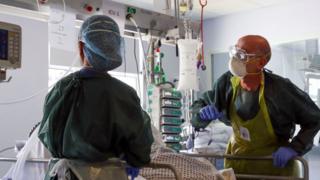 Image copyright
Getty Images
Image copyright
Getty Images
Almost 900,000 public sector workers are to get an above-inflation pay rise, including doctors, teachers and police officers.
Chancellor Rishi Sunak said he recognised their "vital contribution" during the coronavirus pandemic.
The Treasury said the money for the salary increases of up to 3.1% would come from existing departmental budgets.
Labour said the rise would not make up for years of real-terms cuts.
Nurses are not included in the announcement because they negotiated a three-year deal in 2018.
Not all settlements will be UK-wide.
Teachers in England, and dentists and doctors across the UK, will see the largest increases at 3.1% and 2.8% respectively Police, prison officers and National Crime Agency staff in England and Wales will be given a 2.5% rise in pay, while members of the armed forces across the UK will get 2% Members of the judiciary and senior civil servants across the UK will also see their pay topped up by 2%.Chancellor Rishi Sunak said: "These past months have underlined what we always knew, that our public sector workers make a vital contribution to our country and that we can rely on them when we need them.
"It's right, therefore, that we follow the recommendations of the independent pay bodies with this set of real-terms pay rises."
More than 300 NHS workers have died in England alone after contracting coronavirus, many doing so while caring for patients.
Image copyright Getty ImagesBut shadow chancellor Anneliese Dodds said the Conservatives had frozen public sector pay for seven years, and the rises they introduced after that failed to plug the gap.
She said the pay rise was "good news" but added that it "won't make up for a decade of real-term pay cuts" for many front-line workers.
"Many other public sector workers - including those working on the front line in social care - won't get a pay rise out of this at all because the Tories haven't made good on their promises to boost local authority funding," the Labour MP said.
"That's not fair - and it's no way to reward those who've been at the forefront of fighting this pandemic."
Analysis
By BBC business correspondent, Dharshini David
After several months of sweating it out on the front line of an unprecedented crisis, this is some welcome news for almost a million key public sector workers.
But economists say that once inflation is stripped out, average pay for public sector workers remains below levels seen in 2010, due to pay freezes, or very modest increases, in the years of austerity that followed.
And departments won't get extra funding to pay for these rises, a reminder that the government is still having to watch the pennies and pounds as it faces the biggest deficit in its finances in peacetime.
The Treasury claims the pay awards are assessed for affordability; that they shouldn't affect the provision of public services.
But budgets are already under pressure in some areas - in schools, for example, where extra costs may have arisen and income streams from the likes of clubs may have disappeared. In those cases, these pay rises might well pose some tough questions.
Every year, independent pay review bodies recommend pay rises for sectors, and the government said it had accepted all of their suggestions for 2020-21.
The pay awards for the armed forces, prison officers, senior civil servants and NHS staff will be backdated to April, the Treasury said.
However, the pay rise for police and teachers starts in September due to those professions operating on a different pay schedule running from September to August.
Dr David Wrigley, vice-chairman of the British Medical Association, said doctors would feel "disappointed and let down" by the announcement as pay "has fallen way behind" where it should be and "we were hoping for far better" than the 2.8% increase.
He told BBC Breakfast: "These are the sort of rises we'd expect to see in normal times, not in a time when many of us have not had a day off in six months and have been putting our lives on the line."

 5 years ago
540
5 years ago
540 

